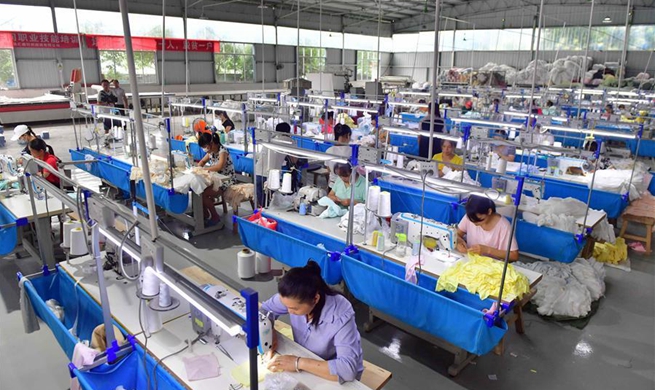CAPE TOWN, July 16 (Xinhua) -- Doctors Without Borders (MSF), a medical charity, on Tuesday voiced concern over the minimal decline in mortality due to AIDS-related diseases since 2014.
Responding to the UNAIDS Global Report 2019, launched earlier on Tuesday in Eshowe, South Africa's KwaZulu Natal province by the Joint United Nations Program on HIV and AIDS (UNAIDS), MSF called on governments, ministries of health, partners and international organizations to step up efforts towards reducing the mortality of people living with HIV.
According to the UNAIDS report, 770,000 people died of HIV worldwide in 2018, only a 30,000 reduction from 2017, compared to 800,000 in 2017 and 840,000 in 2016.
The international community is far away from achieving the goal of cutting AIDS deaths by 50 percent by 2020, to less than 500,000 per year, MSF said.
The goal was set in 2016 by UN member states.
AIDS-related deaths are primarily driven by delayed diagnosis, treatment interruptions and virologic and immunologic failure among HIV-treatment-experienced people, MSF said in a statement emailed to Xinhua.
Timely use of effective diagnostics tools and medicines could prevent most deaths, the humanitarian health organization said.
While an additional 2 million people are reported to be on antiretroviral therapy (ART), more needs to be done by all to confront the killer infections driving AIDS death such as tuberculosis and cryptococcal meningitis, MSF said.
In MSF supported hospitals in the Democratic Republic of Congo, Guinea, Malawi and elsewhere, many deaths occur within 48 hours of admission, explained Dr Gilles Van Cutsem, leader of the MSF HIV/IADS Working Group.
"Patients arrive very ill, often with severe opportunistic infections such as tuberculosis, cryptococcal meningitis, or Kaposi's sarcoma (a type of cancer that can form masses in the skin, lymph nodes, or other organs). When they arrive, sometimes it's too late to save them. They might not have been diagnosed on time, or failed to get access to a life-saving treatment," said Van Cutsem.
Many patients go first to primary healthcare centers when they feel sick, but if primary care clinics are not equipped and trained to detect advanced HIV, patients at risk will remain undetected and untreated, Van Cutsem said.
They will deteriorate until they are terminally ill, with some being referred to hospitals later and often missing the basic tools to manage them, explained Van Cutsem.
Countries in West and Central Africa region in particular need acceleration but are facing a shortfall in international funding including for ART treatment scale up, according to MSF.
"We cannot celebrate or talk of success while hundreds of thousands continue to die of AIDS every year because they do not access basic HIV care, either because they live in countries that are neglected, because they are part of neglected population groups, or because of policies that chose to ignore them," said Van Cutsem.
Preventing, detecting and treating advanced HIV and AIDS, demands more attention and funding, especially in low coverage settings such as West and Central Africa, and in neglected populations, Van Cutsem added.

















